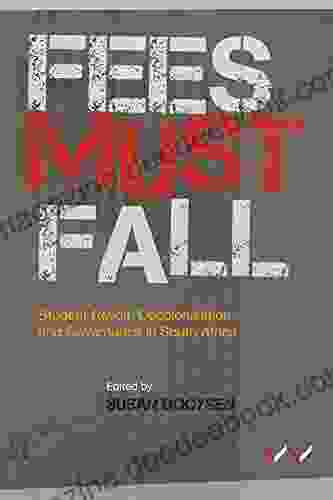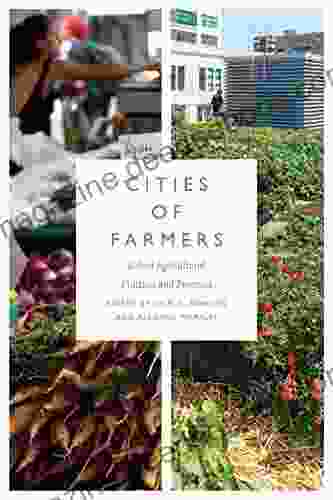Student Revolt, Decolonisation and Governance in South Africa: A Historical and Contemporary Analysis

5 out of 5
| Language | : | English |
| File size | : | 1535 KB |
| Text-to-Speech | : | Enabled |
| Screen Reader | : | Supported |
| Enhanced typesetting | : | Enabled |
| Word Wise | : | Enabled |
| Print length | : | 362 pages |
Student revolt and decolonisation movements have played a significant role in shaping the political landscape and governance of South Africa. From the anti-apartheid struggles of the 1970s and 1980s to the more recent Fees Must Fall and Rhodes Must Fall protests, student movements have consistently challenged the status quo and demanded change.
This article examines the history and contemporary manifestations of student revolt and decolonisation movements in South Africa, exploring their impact on governance and the transformation of higher education.
Historical Context
The roots of student revolt in South Africa can be traced back to the apartheid era, when black students faced systemic discrimination and exclusion from higher education. The Bantu Education Act of 1953 further entrenched these inequalities, creating a separate and inferior system of education for black students.
In response to these injustices, black students began to organise and protest, forming student organisations such as the South African Students' Organisation (SASO) and the Black Consciousness Movement (BCM). These organisations advocated for black self-determination and the decolonisation of education, challenging the white supremacist ideology that underpinned apartheid.
The Soweto Uprising of 1976 marked a turning point in the anti-apartheid struggle, as black students took to the streets to protest against the use of Afrikaans as a medium of instruction. The uprising led to widespread repression and violence, but also galvanised the student movement and brought international attention to the plight of black students in South Africa.
Post-Apartheid Era
After the end of apartheid in 1994, the new democratic government embarked on a process of transformation in higher education, aimed at redressing the inequalities of the past and creating a more inclusive and equitable system.
However, progress in this area has been slow and uneven, and black students continue to face challenges such as financial exclusion, lack of access to quality education, and ongoing racism and discrimination.
In recent years, student movements have re-emerged as a powerful force for change, demanding further transformation and decolonisation of higher education. The Fees Must Fall movement of 2015-2016 was a mass student protest against the high cost of tuition fees, which disproportionately affected black students.
The movement succeeded in forcing the government to make concessions on fees, but also raised broader questions about the governance of higher education and the need for a more inclusive and democratic system.
The Rhodes Must Fall movement of 2015, which demanded the removal of a statue of Cecil Rhodes from the University of Cape Town, was another significant student protest. The movement sparked a national debate about the legacy of colonialism and the need to decolonise education and public spaces.
Impact on Governance
Student revolt and decolonisation movements have had a profound impact on the governance of higher education and South Africa as a whole. The Fees Must Fall movement, in particular, forced the government to recognise the importance of student voices and the need to address the financial barriers that prevent many black students from accessing higher education.
The movement also raised questions about the role of private capital in higher education and the need for greater public funding and regulation of the sector.
The Rhodes Must Fall movement, meanwhile, highlighted the ongoing legacy of colonialism in South Africa and the need to decolonise education and public spaces. The movement's success in removing the Rhodes statue from the University of Cape Town was a symbolic victory, but it also raised questions about the broader need for decolonisation in other areas, such as the curriculum, staff representation, and governance structures.
Challenges and Prospects
Despite the progress that has been made, student revolt and decolonisation movements in South Africa continue to face challenges. The government has been slow to implement reforms and address the underlying inequalities that drive student protests.
Moreover, some critics argue that decolonisation efforts have been too narrow in their focus and have not adequately addressed the broader structural and systemic issues that perpetuate inequality and exclusion in higher education.
Despite these challenges, student revolt and decolonisation movements remain an important force for change in South Africa. They have raised awareness of the ongoing legacy of colonialism and apartheid, and have forced the government to address the need for deeper transformation and decolonisation in higher education and society as a whole.
As South Africa grapples with the challenges of the 21st century, student movements will undoubtedly continue to play a vital role in shaping the country's future.
Student revolt and decolonisation movements have been a defining feature of South African history and politics. From the anti-apartheid struggles of the past to the Fees Must Fall and Rhodes Must Fall protests of the present, student movements have consistently challenged the status quo and demanded change.
These movements have had a profound impact on the governance of higher education and South Africa as a whole, forcing the government to address issues such as financial exclusion, racism, and the legacy of colonialism.
Despite the challenges that remain, student revolt and decolonisation movements continue to be an important force for change in South Africa. They have raised awareness of the ongoing legacy of colonialism and apartheid, and have forced the government to address the need for deeper transformation and decolonisation in higher education and society as a whole.
As South Africa grapples with the challenges of the 21st century, student movements will undoubtedly continue to play a vital role in shaping the country's future.
References
- Bawa, S. (2016). Fees Must Fall: Student Revolt, Decolonisation, and Governance in South Africa. Cape Town: UCT Press.
- Cloete, N., & Bailey, A. (2017). Decolonisation of higher education in South Africa: Perspectives and activism. Journal of Education, 68(2),1-24.
- Godsell, B. (2016). The Rhodes Must Fall movement: A case study in student activism. Acta Academica, 48(1),1-26.
- Jones, P. (2017). Student activism in South Africa: A historical overview. Journal of Education, 68(2),25-47.
- Soudien, C. (2016). Decolonising the university: New directions in transformation. Cape Town: UCT Press.
5 out of 5
| Language | : | English |
| File size | : | 1535 KB |
| Text-to-Speech | : | Enabled |
| Screen Reader | : | Supported |
| Enhanced typesetting | : | Enabled |
| Word Wise | : | Enabled |
| Print length | : | 362 pages |
Do you want to contribute by writing guest posts on this blog?
Please contact us and send us a resume of previous articles that you have written.
 Book
Book Chapter
Chapter Genre
Genre Paperback
Paperback E-book
E-book Magazine
Magazine Newspaper
Newspaper Sentence
Sentence Bookmark
Bookmark Shelf
Shelf Bibliography
Bibliography Foreword
Foreword Preface
Preface Manuscript
Manuscript Tome
Tome Autobiography
Autobiography Memoir
Memoir Encyclopedia
Encyclopedia Thesaurus
Thesaurus Narrator
Narrator Character
Character Resolution
Resolution Borrowing
Borrowing Stacks
Stacks Archives
Archives Periodicals
Periodicals Research
Research Lending
Lending Reserve
Reserve Academic
Academic Journals
Journals Reading Room
Reading Room Rare Books
Rare Books Special Collections
Special Collections Interlibrary
Interlibrary Dissertation
Dissertation Reading List
Reading List Book Club
Book Club Theory
Theory Textbooks
Textbooks John A Hoda
John A Hoda Megan Atwood
Megan Atwood Dr Patient
Dr Patient Joe Schreiber
Joe Schreiber Mariel Monsour
Mariel Monsour Paul Perro
Paul Perro Samuel Scheffler
Samuel Scheffler Martine Reid
Martine Reid Maxime C Cohen
Maxime C Cohen Joseph Bailey
Joseph Bailey G R Berridge
G R Berridge Leo Perutz
Leo Perutz Caleb Lanning
Caleb Lanning Konstantin Tsakalidis
Konstantin Tsakalidis Mindy Klasky
Mindy Klasky Benjamin Hebblethwaite
Benjamin Hebblethwaite Willie Nelson
Willie Nelson William J Pepe
William J Pepe Benjamin Leduc
Benjamin Leduc Callum Newman
Callum Newman
Light bulbAdvertise smarter! Our strategic ad space ensures maximum exposure. Reserve your spot today!
 Norman ButlerFollow ·12.8k
Norman ButlerFollow ·12.8k Giovanni MitchellFollow ·3.2k
Giovanni MitchellFollow ·3.2k Felix HayesFollow ·15.6k
Felix HayesFollow ·15.6k Ernest HemingwayFollow ·6.8k
Ernest HemingwayFollow ·6.8k Brenton CoxFollow ·16.5k
Brenton CoxFollow ·16.5k Stephen KingFollow ·10.8k
Stephen KingFollow ·10.8k Jules VerneFollow ·14.8k
Jules VerneFollow ·14.8k Junot DíazFollow ·4.6k
Junot DíazFollow ·4.6k

 Thomas Hardy
Thomas HardyA Comprehensive Study Guide for Jules Verne's Journey to...
Embark on an...

 Hugo Cox
Hugo CoxPacific Steam Navigation Company Fleet List History: A...
Prologue: A Maritime Legacy...

 William Wordsworth
William WordsworthThe Practice of Generalist Social Work: Embracing a...
The field of social work encompasses a...

 Damon Hayes
Damon HayesPractical Biometrics: From Aspiration to Implementation
What is Biometrics? ...

 Nikolai Gogol
Nikolai GogolDust of the Zulu Ngoma Aesthetics After Apartheid:...
The rhythmic beat of the Ngoma drum...
5 out of 5
| Language | : | English |
| File size | : | 1535 KB |
| Text-to-Speech | : | Enabled |
| Screen Reader | : | Supported |
| Enhanced typesetting | : | Enabled |
| Word Wise | : | Enabled |
| Print length | : | 362 pages |














